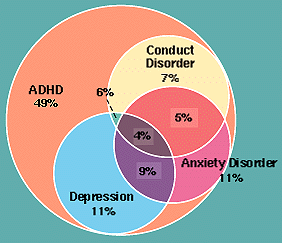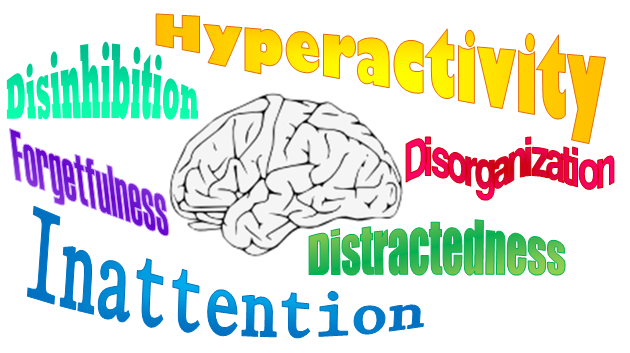ADHD
Attention Deficit Hyperactivity Disorder (ADHD)
Attention-deficit/hyperactivity disorder (ADHD) is a disorder characterized by inability to attend to what is happening around the person for more than a few seconds, and hyperactive, impulsive behavior.It begins in childhood and can persist in adulthood.
Treatment can make a big difference. With proper medication and handling the child can grow up to be a vibrant, active and successful adult.
See also: Dealing with your child with ADHD
Causes:
Today it is generally agreed that ADHD is a biological condition resulting from dysfunction in the brain.
- Altered brain development. Slow development of the areas of the brain that control activity and attention leads to inattention.A region of the brain known as the frontal cortex is involved in ADHD along with circuits of the neurotransmitter dopamine between the pre-frontal cortex and the basal ganglia.

- The frontal cortex deals mainly with executive functions such as problem solving, attention, reasoning, and planning, and these functions are deficient in ADHD. The pre-frontal cortex is the brain’s “command center” while the basal ganglia translate the commands into action.
- Genetics. ADHD runs in families.
- Exposure to toxins during pregnancy. Exposure to environmental poisons, such as polychlorinated biphenyls (PCBs), and smoking, and alcohol or drug abuse during pregnancy may reduce activity of the nerve cells (neurons) that produce neurotransmitters and result in attention deficit and / or hyperactivity.
- Exposure to environmental toxins in childhood. . Exposure to lead, which is found mainly in paint and pipes in older buildings, and PCBs in childhood has been linked to short attention span and disruptive and / or violent behavior.
Coexisting conditions

How to differentiate a normally overactive child from one with ADHD? Click Here

Symptoms of inattention
- Failing to pay close attention to details or making careless mistakes in schoolwork or other activities
- Trouble sustaining attention during tasks or play
- Not listening even when spoken to directly
- Difficulty following through on instructions resulting in failing to finish schoolwork, or other tasks
- Problems in organizing tasks or activities
- Avoidance of tasks that require sustained attention, such as schoolwork or homework
- Often forgetful and frequently losing needed items, such as books, pencils, toys or tools
- Easily distracted
Symptoms of hyperactivity:
- Fidgeting or squirming frequently and leaving the seat in situations when remaining seated is expected (e.g. classroom)
- Constantly on the go running or climbing excessively when it’s not appropriate
- Inability to play quietly
- Talking excessively and blurts out replies before questions have been completely asked and interrupting or intruding on others’ conversations or games
- Difficulty waiting for their turn
Treatment:
Standard treatments for ADHD in children include medications and counseling. Other treatments to ease ADHD symptoms include special accommodations in the classroom, and family and community support.
ADHD doesn’t cause other psychological or developmental problems. However, children with ADHD are more likely to have other childhood behavior disorders or learning disability.
Call Today
95661 33660
